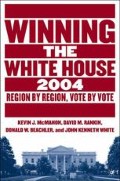Abstract
The transformation of the American West has opened a dynamic gateway to victory in the Electoral College. As a monument to the early western gateway, the St. Louis Arch now leads across a Republican heartland through the Great Plains to the Rockies. Unlike the steel frame of the manmade arch on the western banks of the Mississippi River, the natural monuments of the West continue to change their shape over time albeit not as quickly as demographic trends reshape the western electoral landscape.
Access this chapter
Tax calculation will be finalised at checkout
Purchases are for personal use only
Preview
Unable to display preview. Download preview PDF.
Notes
V. O. Key, Jr., “A Theory of Critical Elections,” in Electoral Change and Stability in American Political History, edited by Jerome Chubb and Howard Allen ( New York: Free Press, 1971 ), 43.
See Walter Dean Burnham, Critical Elections and the Mainsprings of American Politics ( New York: Norton, 1970 ).
Kristi Anderson, The Creation of a Democratic Majority, 1928–1936 ( Chicago: University of Chicago Press, 1979 ).
Rick Perlstein, Before the Storm: Barry Goldwater and the Unmaking of the American Consensus ( New York: Hill and Wang, 2001 ).
Kevin Phillips, The Emerging Republican Majority ( Garden City, NY: Anchor Books, 1970 ).
Everett Carll Ladd, Jr. with Charles D. Hadley, Transformations of the American Party System: Party Coalitions from the New Deal to the 1970s ( New York: Norton, 1975 ).
Ruy Texeira and Joel Rogers, America’s Forgotten Majority: Why the White Working Class Matters ( New York: Basic Books, 2000 ).
John Petrocik, Party Coalitions: Realignment and the Decline of the New Deal Party System ( Chicago: University of Chicago Press, 1981 ).
Paul Light and Celinda Lake, “The Election: Candidates, Strategies, and Decisions,” in The Elections of 1984, edited by Michael Nelson ( Washington, DC: CQ Press, 1985 ), 83–110.
See Robert Dallek, Ronald Reagan: The Politics of Symbolism ( Cambridge, MA: Harvard University Press, 1999 ).
Stanley Greenberg, Middle Class Dreams: The Politics and Power of the New American Majority ( New Haven, CT: Yale University Press, 1995 ).
See Mark Rozell and Clyde Wilcox, God at the Grass Roots (Lanham, MD: Rowman & Littlefield, 1995).
Francis E. Rourke and John T. Tierney, “The Setting: Changing Patterns of Presidential Politics, 1960 and 1988,” in Elections of 1988, edited by Michael Nelson ( Washington, DC: CQ Press, 1989 ), 1–24.
See Gerald Pomper, ed., The Election of 1992 ( New York: Chatham House, 1993 ).
See Gerald Pomper, “The Presidential Election,” in The Election of 1996, edited by Gerald Pomper ( New York: Chatham House, 1997 ), 173–204.
Stanley Greenberg, The Two Americas: Our Current Political Deadlock and How to Break It ( New York: St. Martin’s Press, 2004 ), 127.
Rudolfo de la Garza and Louis DeSipio, eds., Awash in the Mainstream: Latino Politics in the 1996 Election ( Boulder, CO: Westview Press, 1999 ).
Paul R. Abramson, John H. Aldrich, and David W. Rohde, Change and Continuity in the 2000 and 2002 Elections ( Washington, DC: CQ Press, 2003 ), 104.
John B. Judis and Ruy Teixeira, The Emerging Democratic Majority ( New York: Scribner, 2002 ), 85.
Karl A. Lamb and Paul A. Smith, Campaign Decision-Making: The Presidential Election of 1964 ( Belmont, CA: Wadsworth, 1968 ), 59.
John C. Green, Mark J. Rozell, and Clyde Wilcox, eds., Prayers in the Precints: The Christian Right in the 1998 Elections ( Washington, DC: Georgetown University Press, 2000 ).
John Kenneth White, The Values Divide: American Politics and Culture in Transition ( New York: Chatham House Publishers, 2003 ), 167.
David Brooks, Bobos in Paradise: The New Upper Class and How They Got There ( New York: Simon and Schuster, 2000 ), 43.
See Thomas Frank, What’s the Matter with Kansas? How Conservatives Won the Heart of America ( New York: Metropolitan Books, 2004 ), 16.
Barry Goldwater with Jack Casserly, Goldwater ( New York: Doubleday, 1988 ).
Morris Fiorina, Culture War? The Myth of a Polarized America ( New York: Pearson, 2005 ), 106.
Copyright information
© 2005 Kevin J. McMahon, David M. Rankin, Donald W. Beachler, and John Kenneth White
About this chapter
Cite this chapter
Rankin, D.M. (2005). The West. In: Winning the White House, 2004. Palgrave Macmillan, New York. https://doi.org/10.1057/9781403980861_8
Download citation
DOI: https://doi.org/10.1057/9781403980861_8
Publisher Name: Palgrave Macmillan, New York
Print ISBN: 978-1-4039-6881-4
Online ISBN: 978-1-4039-8086-1
eBook Packages: Palgrave Political & Intern. Studies CollectionPolitical Science and International Studies (R0)

